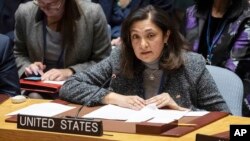President Joe Biden made a commitment to prioritize human rights in American foreign policy, said Under Secretary of State Uzra Zeya in recent remarks at the Human Rights Defender Award Ceremony.
“[W]e’ve delivered important progress and innovations that will leave a lasting legacy on human rights around the globe, including leveraging global institutions to address U.S. human rights priorities, where we made a firm commitment to reassert U.S. multilateral leadership, return to UN bodies like the Human Rights Council, and build new ties with new and emerging partners.”
Resulting milestone outcomes included suspending Russia from the UN Human Rights Council due to its invasion of Ukraine, and forging global consensus on the first-ever UN General Assembly resolution on advancing safe, secure, and trustworthy artificial intelligence for sustainable development.
“We also secured the world’s first treaty on AI at the Council of Europe, which defines a shared vision for how rights-respecting governments will approach AI in a way that is consistent with respect for human rights, democracy, and the rule of law,” said Under Secretary Zeya.
“We also employed novel and diverse accountability tools to hold human rights abusers accountable,” said Under Secretary Zeya.
“We expanded our toolkit with the strategic goal of changing behavior and deterring would-be violators. Through close cooperation with the Departments of Commerce and Treasury, we used export controls and sanctions to hold commercial spyware vendors like NSO Group, Intellexa, Cytrox, and others accountable for selling malicious cyber intrusion tools to those repressing human rights and threatening human rights defenders.”
The State Department furthered these efforts by implementing visa restrictions on individuals who misuse commercial spyware or derive a financial benefit from the misuse of this technology as well as their family members.
And finally, the U.S. has tackled new and emerging threats head-on, declared Under Secretary Zeya.
“We’ve put transnational repression, or TNR, on the agenda of the UN and instituted a new policy at home to restrict visas for perpetrators. We’ve also provided more than $16 million in active programs to those defenders working to counter corruption, including the journalists working to expose it.”
The United States stands well positioned to continue to defend and promote human rights around the world.






